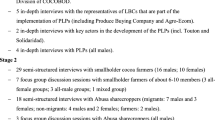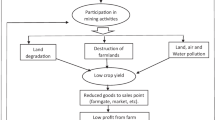Abstract
There is little evidence of published literature regarding the incorporation of on-farm workers into global fresh produce value chains. Agriculture, a major sector in Pakistan, employs 50% of the total labor force, and contributes 21 and 30% to GDP and GNP, respectively. Two-thirds of the population resides in rural areas. Mango is the second major fruit product in the country. The horticulture industry of Pakistan in general, and the mango sector specifically, has been the focus of research and development efforts by governmental and various international developmental organizations. A participatory value chain approach has been adopted to enhance technological advancements and increase the competitiveness of farm enterprises. The adoption of best practices is slow due to a lack of attention to occupational health measures, lack of training and low wages among on-farm workers. Market incentives, compliance standardization and increasing demand for certified products has driven mango farms in Pakistan to seek certification by organizations such as GLOBALG.A.P., which has established provisions for decent work to focus on worker rights and safety. A sustainable livelihood for workers can be achieved by upgrading the value chain system through institutional reforms and an emerging philosophy of decent work put forth by the International Labour Organization. In this study, the effects of decency in the value chain on the income of on-farm workers were assessed at both GlobalG.A.P.-certified and non-certified orchards in Sindh and southern Punjab. Because of the food quality and safety standards required for certified orchards within the global value chain system, these compliant orchards offer greater potential for improving the livelihoods of on-farm workers. To overcome constraints, extensive awareness campaigns should be launched within the mango industry by institutional supportive bodies.

Similar content being viewed by others
References
ACIAR (2007) A constraint analysis of Pakistan mango supply chain. Australian Centre for International Agricultural Research, Canberra
Adato M, Meinzen-Dick R (2002) Assessing the impact of agricultural research on poverty using the sustainable livelihoods framework. International Food Policy Research Institute, Washington
Astill A, Griffith M (2004) Clean up your computer: working conditions in the electronics sector. CAFOD, London
Banerjee B, Knight JB (1985) Caste discrimination in the Indian urban labour market. J Dev Econ 17(3):277–307
Barrientos S, Gereffi G, Rossi A (2010) Economic and social upgrading in global production networks: developing a framework for analysis. Int Labor Rev 150(3–4):319–340
Bartel AP (1995) Training, wage growth, and job performance: evidence from a company database. J Labor Econ 13(3):401–425
Best S, Mamic I (2008) Global agri-food chains: employment and social issues in fresh fruit and vegetables. International Labour Organization, Geneva
Brown D (2007) Globalization and employment conditions study. World Bank, Washington (social protection discussion paper 0708)
Chambers R, Conway G (1992) Sustainable rural livelihoods: practical concepts for the 21st century. IDS, Brighton (IDS discussion paper 296)
Collins JL (2009) Threads: gender, labor, and power in the global apparel industry. University of Chicago Press, Chicago
Collins RJ, Dunne AJ (2007) A rapid supply chain appraisal approach for agribusiness development projects. In: II International symposium on improving the performance of supply chains in the transitional economies paper no. 794 Sep 23, pp 73–80
Collins R, Iqbal M (2010) Integrating post-harvest, marketing and supply chain systems for sustainable industry development: the Pakistan mango industry as work in progress. In: Batt PJ (ed) Third international symposium on improving the performance of supply chains in the transitional economies, 4–8 July 2010, Kuala Lumpur, Malaysia
CSF (2007) Horticulture action plan: background paper. Competitive Support Fund. Ministry of Finance, Government of Pakistan, Islamabad
Das MB, Dutta P (2007) Does caste matter for wages in the Indian labor market?. World Bank, Washington (draft paper)
Diewert WE (1974) The effects of unionization on wages and employment: a general equilibrium analysis. Econ Inq 12(3):319–339
FAO (2015) FAOSTAT, Food and Agriculture Organization of the United Nations (FAO) October 03, 2015
Freeman RB (1981) The effect of unionism on fringe benefits. ILR Rev 34(4):489–509
Freeman RB (1982) Union wage practices and wage dispersion within establishments. ILR Rev 36(1):3–21
Freeman RB (1984) Longitudinal analyses of the effects of trade unions. J Labor Econ 2(1):1–26
Ghafoor A, Mustafa K, Mushtaq K, Abedullah (2009) Cointegration and causality: an application to major mango markets in Pakistan. Lahore J Econ 14:85–113
Ghani MA (2012) Article: labour laws and agriculture workers. Pakistan. Business recorder. Available at https://fp.brecorder.com/2012/01/201201151142813/. Accessed 15 Jan 2012
Global GAP (2016) Database, certified orchards in Pakistan. Available at https://www.GlobalGAP.org
Government of Pakistan (2009) Pakistan economic survey 2013–14. Government of Pakistan, Finance Division, Economic Affairs Wing, Islamabad
Government of Pakistan (2016) Agricultural statistics of Pakistan 2013–14. Pakistan Bureau of Statistics, Statistics Division, Islamabad
Griliches Z, Mason WM (1972) Education, income, and ability. J Political Econ 80(3, part 2):74–103
Gujarati DN (1995) Basic econometrics, 3rd edn. McGraw-Hill Publishing Company, Maidenheach
Gundersen B (2003) Unions and the well-being of low-skill workers. Dissertation, George Warren Brown School of Social Work, Washington University
Hale A, Wills J (2007) Women working worldwide: transnational networks, corporate social responsibility and action research. Glob Netw 7(4):453–476
Hirsch BT (1997) Unionization and economic performance: evidence on productivity, profits, investment, and growth. Fraser Institute, Vancouver
Hirsch BT, Macpherson DA (2003) Union membership and coverage database from the current population survey: note. ILR Review 56(2):349–354
Hirsch BT, Macpherson DA, DuMond JM (1997) Workers’ compensation recipiency in union and nonunion workplaces. ILR Rev 50(2):213–236
HRW (2002) Tainted harvest. child labor and obstacles to organizing on Ecuador’s banana plantations. Human Rights Watch, New York
Humphrey J, Memedovic O (2006) Global value chains in the agri-food sector. A report submitted to (FAO) Food and Agriculture Organizations of United Nations. https://agris.fao.org
Hurst P, Termine P, Karl M (2005) Agricultural workers and their contribution to Sustainable Agriculture and Rural Development, International Labour Organization (ILO), International Union of Food, Agricultural, Hotel, Restaurant, Catering, Tobacco and Allied Workers’ Associations (IUF). Report submitted to (FAO) Food and Agriculture Organizations of United Nations. 03 April
ICDD (2014) Supply Chain Governance: A decent work approach to optimize mango value chain in Pakistan. Project details. Available at http://www.uni-kassel.de/einrichtungen/international-center-for-development-and-decent-work-icdd/research/research-2015-2019/1-global-agricultural-production-systems-gaps.html
ILO (2015) International Labour Organization, Goal #8, agenda for sustainable development; decent work and economic growth. International Labour Organization, Geneva. Available at https://www.ilo.org/wcmsp5/groups/public/---ed_norm/---relconf/documents/meetingdocument/wcms_545837.pdf
ILO (2016), Decent Work Programme in Pakistan, SDG N0. 8, International Labour Organization. Available at https://www.ilo.org/wcmsp5/groups/public/---ed_mas/---program/documents/genericdocument/wcms_561025.pdf
Kadigi RM, Mdoe NS, Senkondo E, Mpenda Z (2007) Effects of food safety standards on the livelihoods of actors in the Nile perch value chain in Tanzania (No. 2007: 24). DIIS working paper
Locke R, Kochan T, Romis M, Qin F (2007) Beyond corporate codes of conduct: work organization and labour standards at Nike’s suppliers. Int Labour Rev 146(1–2):21–40
Mehdi M, Adeel A, Ahmad Z, Abdullah M, Hussain F (2014) Effectiveness of a “whole of chain” approach in linking farmers to market: a case of Pakistan mango market. UMK Procedia 1:57–62
Mehdi M, Ahmad B, Yaseen A, Adeel A, Sayyed N (2016) A comparative study of traditional versus best practices mango value chain. Pak J Agri Sci 53(3):733–742
Mincer J (1974) Schooling, experience, and earnings. Human Behavior and Social Institutions No. 2
Mishel L, Walters M (2003) How unions help all workers. EPI Briefing Paper# 143
Nuwayhid IA (2004) Occupational health research in developing countries: a partner for social justice. Am J Public Health 94(11):1916–1921
Oxfam International (2004) Trading away our rights: women working in global supply chains. Oxfam International, Oxford
PHDEC (2005) Mango marketing strategy, Pakistan Horticultural Development and Export Company, Lahore
Raworth K (2004) Trading away our rights: women working in global supply chains. Oxfam Policy Pr Priv Sect 1(1):1–52
Raynolds LT, Douglas M, Peter LT (2004) Fair trade coffee: building producer capacity via global networks. J Int Dev 16(8):1109–1121
Scherrer C (2017) Addressing the decent work deficit in agricultural supply chains. Paper presented in 5th conference on regulating for decent work, 3–5 July, ILO Geneva
Serrat O (2008). The sustainable livelihoods approach, DC: Asian Development Bank. Knowledge Solutions. November, 15. https://www.adb.org/Knowledgesolutions
Smith S, Tallontire A, Dolan C, Barrientos S (2005) Reaching the marginalised? Gender value chains and ethical trade in African horticulture. Dev Pract 15(3–4):559–571
Sono HS (2013) The effects of Adra’s mango project on livelihoods in the Yilo Krobo district. Doctoral dissertation, University of Ghana)
Wognum PM, Bremmers H, Trienekens JHVD, Vorst JGAJ, Bloemhof JM (2011) Systems for sustainability and transparency of food supply chains—current status and challenges. Adv Eng Inform 25(1):65–76
World Bank (2017) Annual report. Available at http://pubdocs.worldbank.org/en/908481507403754670/Annual-Report-2017-WBG.pdf
Author information
Authors and Affiliations
Corresponding author
Rights and permissions
About this article
Cite this article
Ahsan, M.B., Mehdi, M., Ahmad, B. et al. Understanding the Interdependence Between Worker Livelihoods and Decent Work at Certified and Non-Certified Mango Orchards in Pakistan. Earth Syst Environ 2, 621–632 (2018). https://doi.org/10.1007/s41748-018-0075-5
Received:
Accepted:
Published:
Issue Date:
DOI: https://doi.org/10.1007/s41748-018-0075-5




